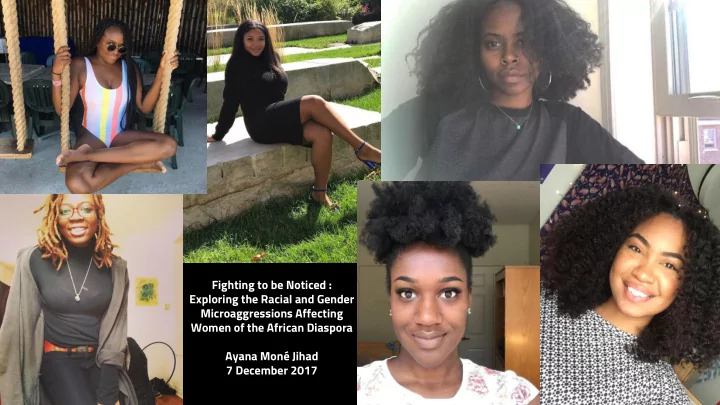

Fighting to be Noticed : Exploring the Racial and Gender Microaggressions Affecting Women of the African Diaspora Ayana Moné Jihad 7 December 2017
The Leadership Scholars Certificate Program is a two-year selective, interdisciplinary certificate program that prepares Rutgers undergraduate women to be informed, innovative, and socially responsible leaders. Leadership Scholars design and implement social action projects to expand their understanding of issues and problems and to develop leadership skills. This project gives Scholars the opportunity to apply the theoretical knowledge they have gained about leadership, advocacy, and social change with the practical and experiential knowledge they have developed about a particular policy issue or problem through the field site placement. It also further develops leadership skills by giving undergraduates the opportunity to practice leadership through action. To find out more please visit the Institute for Women’s Leadership’s website at http://iwl.rutgers.edu.
The Project ▪ Short film exploring the lives of students who identify as women of the African diaspora discussing the racial and gender microaggressions that are hidden among the Rutgers Community. Mission Statement: This project will educate others on the details of the Black Community at Rutgers University. It will inform others of the pain, hurt, beauty, triumphs, and successes of Black bodies on campus, a narrative that has been erased by negative stereotypes and poorly taught Black history in mainstream education. The purpose of this film is to ensure everyone who is willing to share their narratives are all heard. All the elements of microaggressions are shared and understood. The outcome of this research will bring awareness, begin a difficult dialogue and help other marginalized students feel liberated enough to share their narratives.
The Intellectual and Conceptual Foundations Policy • Violence • Systemic • Results • History Visible/ Overt • Behavior • Microaggressions • Language • Systemic • Implicit Bias • Microassaults Invisible/ Covert • Language • Beliefs • Assumptions • Emotions / Feelings • Perceptions • Photo Source
Women’s Leadership for Social Change Lead, Change, Inspire, and Empower
“You alone are enough. You have nothing to prove Lessons Learned and Insight to anybody.” ― Maya Angelou “No pressure, no diamonds” “I suppose leadership at one time meant muscles; ― Thomas Carlyle but today it means getting along with people.” ― Mahatma Gandhi “It's kind of selfish to say that you're only going to fight for a victory that you will live to see. “ ― Ta-Nehisi Coates “It's in the act of having to do things that you don't want to that you learn something about moving past the self. Past the ego.” ― bell hooks “Your silence will not protect you.” ― Audre Lorde
Looking Towards the Future Sharing My Work Encourage Meaningful and Difficult Dialogue Continue to Create Content That is Meaningful to my Brand Future IWL Scholars Can Use my Work to Continue the Study of Microaggressions
Works Cited Blume, A. W., Lovato, L. V., Thyken, B. N., & Denny, N. (2012). The relationship of microaggressions with alcohol use and anxiety among ethnic minority college students in a historically White institution. Cultural Diversity And Ethnic Minority Psychology , 18 (1), 45-54. doi:10.1037/a0025457 Coates, Ta-Nehisi. Between the World and Me . Spiegel & Grau, 2015. Daniel Solorzano, author, et al. "Critical Race Theory, Racial Microaggressions, and Campus Racial Climate: The Experiences of African American College Students." The Journal of Negro Education , no. 1/2, 2000, p. 60. EBSCOhost Embrick, David G., et al. "More Than Just Insults: Rethinking Sociology's Contribution to Scholarship on Racial Microaggressions." Sociological Inquiry, vol. 87, no. 2, May 2017, pp. 193-206. EBSCOhost, doi:10.1111/soin.12184. Fleras, Augie. "Theorizing Micro-Aggressions as Racism 3.0: Shifting the Discourse." Canadian Ethnic Studies Journal, no. 2, 2016, p. 1. EBSCOhost, login.proxy.libraries.rutgers.edu/login?url=http://search.ebscohost.com/login.aspx?direct=true&db=edsglr&AN=edsgcl.471474238&site=e ds-live. Hall, Stuart, et al. The fateful triangle race, ethnicity, nation . Harvard University Press, 2017 Minikel-Lacocque, Julie. “Racism, College, and the Power of Words: Racial Microaggressions Reconsidered.” American Educational Research Journal , vol. 50, no. 3, 2013, pp. 432–465. JSTOR , JSTOR, www.jstor.org/stable/23526109. Rankine, Claudia. Citizen . Graywolf Press, 2014 Scarlet and Black: Slavery and Dispossession in Rutgers History. Ed. Marisa J. Fuentes and Deborah Gray White. vol. 1, Rutgers University Press, 2016. Sue, DW, et al. "Racial Microaggressions in the Life Experience of Black Americans." Professional Psychology-Research and Practice , vol. 39, no. 3, n.d., pp. 329-336. EBSCOhost .
Recommend
More recommend